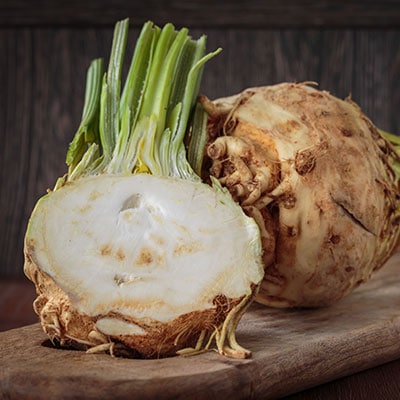Celeriac | Whole Food Nutrition
Closely related and similar to celery in taste, celeriac is not the root of the celery plant.
Celeriac was first discovered in the Mediterranean Basin area.
Background
- Celeriac, also known as celery root, is part of the Apiaceae botanical family. This botanical family consists of multiple plant foods including carrot, celery, coriander, cumin, dill, fennel, parsley, and parsnip.
- Celeriac produces a round knobby root-like tuber just underneath the surface of the soil. This root-like tuber is actually a stem known as a hypocotyl.
Nutrition
- Celeriac is a good source of vitamin C and an excellent source of vitamin K. It also contains beneficial amounts of phosphorus, potassium, vitamin B6, manganese, and fiber.
- Vitamin C supports wound healing, immune function, and formation of collagen and connective tissue.
- Vitamin K encourages blood clotting and strong bones.
- Phosphorus benefits bone formation, energy production, and hormone storage and activation.
- Potassium regulates blood pressure, carbohydrate metabolism, heart function, and muscle contraction.
- Vitamin B6 aids in immune and nervous system function as well as red blood cell formation and protein, carbohydrate, and fat metabolism.
- Manganese supports cartilage and bone formation and wound healing.
- Fiber promotes a healthy digestive system by normalizing bowel movements while also helping to maintain a healthy weight.
How to Purchase, Prepare, and Store
- Purchase celeriac that are small to medium in size. They should be firm and heavy for their size. Avoid those with soft spots.
- Prepare the celeriac by first scrubbing the outer layer and then peeling the outer skin with a knife.
- Celeriac will oxidize when exposed to air. To reduce surface darkening, place the celeriac in a bowl of water containing lemon juice or a small amount of vinegar until ready to use.
- When stored in a plastic bag, celeriac can be refrigerated for 1-2 weeks.
- Enjoy celeriac raw or cooked — add to salads, soups, and other favorite dishes.
Nutrition Facts
1/2 cup celeriac, raw
- Calories: 33
- Protein: 1.2 g
- Fat: 0.2 g
- Carbohydrate: 7.2 g
- Fiber: 1.4 g
- Calcium: 33.5 mg
- Iron: 0.5 mg
- Magnesium: 0.1 mg
- Phosphorus: 89.5 mg
- Folate: 6.3 µg
- Vitamin A: 0 µg
Via fdc.nal.usda.gov

